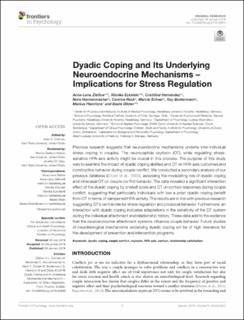Please use this identifier to cite or link to this item:
https://doi.org/10.21256/zhaw-4369| Publication type: | Article in scientific journal |
| Type of review: | Peer review (publication) |
| Title: | Dyadic coping and its underlying neuroendocrine mechanisms : implications for stress regulation |
| Authors: | Zietlow, Anna-Lena Eckstein, Monika Hernández, Cristóbal Nonnenmacher, Nora Reck, Corinna Schär Gmelch, Marcel Bodenmann, Guy Heinrichs, Markus Ditzen, Beate |
| DOI: | 10.3389/fpsyg.2018.02600 10.21256/zhaw-4369 |
| Published in: | Frontiers in Psychology |
| Volume(Issue): | 9 |
| Issue: | 2600 |
| Issue Date: | 9-Jan-2019 |
| Publisher / Ed. Institution: | Frontiers Research Foundation |
| ISSN: | 1664-1078 |
| Language: | English |
| Subjects: | Dyadic coping; Couple conflict; Oxytocin; HPA-axis; Cortisol; Relationship satisfaction |
| Subject (DDC): | 158: Applied psychology 610: Medicine and health 616.89: Mental disorders, clinical psychology and psychiatry |
| Abstract: | Previous research suggests that neuroendocrine mechanisms underlie inter-individual stress coping in couples. The neuropeptide oxytocin (OT), while regulating stresssensitive HPA-axis activity might be crucial in this process. The purpose of this study was to examine the impact of dyadic coping abilities and OT on HPA-axis outcomes and constructive behavior during couple conflict. We conducted a secondary analysis of our previous database (Ditzen et al., 2009), assessing the modulating role of dyadic coping and intranasal OT on couple conflict behavior. The data revealed a significant interaction effect of the dyadic coping by oneself score and OT on cortisol responses during couple conflict, suggesting that particularly individuals with low a priori dyadic coping benefit from OT in terms of dampened HPA-activity. The results are in line with previous research suggesting OT’s central role for stress regulation and prosocial behavior. Furthermore, an interaction with dyadic coping indicates adaptations in the sensitivity of the OT system during the individual attachment and relationship history. These data add to the evidence that the neuroendocrine attachment systems influence couple behavior. Future studies of neurobiological mechanisms underlying dyadic coping will be of high relevance for the development of prevention and intervention programs. |
| Further description: | This article was submitted to Clinical and Health Psychology, a section of the journal Frontiers in Psychology |
| URI: | https://digitalcollection.zhaw.ch/handle/11475/14460 |
| Fulltext version: | Published version |
| License (according to publishing contract): | CC BY 4.0: Attribution 4.0 International |
| Departement: | Applied Psychology |
| Organisational Unit: | Institute of Applied Psychology (IAP) |
| Appears in collections: | Publikationen Angewandte Psychologie |
Files in This Item:
| File | Description | Size | Format | |
|---|---|---|---|---|
| 2019_Schaer_Marcel_Dyadic_coping_and_its_underlying_neuroendocrine_mechanisms.pdf | 675.87 kB | Adobe PDF |  View/Open |
Show full item record
Zietlow, A.-L., Eckstein, M., Hernández, C., Nonnenmacher, N., Reck, C., Schär Gmelch, M., Bodenmann, G., Heinrichs, M., & Ditzen, B. (2019). Dyadic coping and its underlying neuroendocrine mechanisms : implications for stress regulation. Frontiers in Psychology, 9(2600). https://doi.org/10.3389/fpsyg.2018.02600
Zietlow, A.-L. et al. (2019) ‘Dyadic coping and its underlying neuroendocrine mechanisms : implications for stress regulation’, Frontiers in Psychology, 9(2600). Available at: https://doi.org/10.3389/fpsyg.2018.02600.
A.-L. Zietlow et al., “Dyadic coping and its underlying neuroendocrine mechanisms : implications for stress regulation,” Frontiers in Psychology, vol. 9, no. 2600, Jan. 2019, doi: 10.3389/fpsyg.2018.02600.
ZIETLOW, Anna-Lena, Monika ECKSTEIN, Cristóbal HERNÁNDEZ, Nora NONNENMACHER, Corinna RECK, Marcel SCHÄR GMELCH, Guy BODENMANN, Markus HEINRICHS und Beate DITZEN, 2019. Dyadic coping and its underlying neuroendocrine mechanisms : implications for stress regulation. Frontiers in Psychology. 9 Januar 2019. Bd. 9, Nr. 2600. DOI 10.3389/fpsyg.2018.02600
Zietlow, Anna-Lena, Monika Eckstein, Cristóbal Hernández, Nora Nonnenmacher, Corinna Reck, Marcel Schär Gmelch, Guy Bodenmann, Markus Heinrichs, and Beate Ditzen. 2019. “Dyadic Coping and Its Underlying Neuroendocrine Mechanisms : Implications for Stress Regulation.” Frontiers in Psychology 9 (2600). https://doi.org/10.3389/fpsyg.2018.02600.
Zietlow, Anna-Lena, et al. “Dyadic Coping and Its Underlying Neuroendocrine Mechanisms : Implications for Stress Regulation.” Frontiers in Psychology, vol. 9, no. 2600, Jan. 2019, https://doi.org/10.3389/fpsyg.2018.02600.
Items in DSpace are protected by copyright, with all rights reserved, unless otherwise indicated.